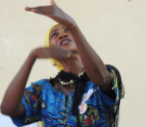“We need to be done with treating the public reading of Scripture as a “dead time” in our weekly Christian worship.
We would never mumble through William Shakespeare or Maya Angelou in the same way.
We would never treat any other piece of poetry, story, or literature with the same amount of indifference that we do the Bible every week.
It’s an abomination, what we do with the living Word of God.”
So said GoTell president Tom Boomershine in his “Founder’s Talk” at the Festival Gathering of the Network of Biblical Storytellers last month. Jason Chesnut (who among other things led the most incredible series of worship services during the FG) posted them on his blog to introduce “Six (Biblical) Reasons to Tell Biblical Stories (Instead of Simply Reading Them)”Check it out…
Cupid Shuffle at the 2014 NBS Olympics
Amelia Boomershine
It wasn’t all serious. We did our work giving talks, leading workshops, telling stories (that’s work?) and all, but we also enjoyed many laughs, especially at the 2014 Festival Gathering Olympics. In between games we got to dance the Cupid Shuffle. I’m in a denim jacket up front; Tom is in the blue West African shirt in the back.
Want to see the actual game? Here’s a glimpse of biblical storytellers in fierce balloon-popping competition. They were supposed to stop when the music started up again but who was listening? I guess biblical storytellers aren’t noted for following rules.
Memory and Manuscript in the Performance of Mark’s Passion and Resurrection Narrative
Thomas E. Boomershine
There are mnemonic structures built into every story of Mark’s passion/resurrection narrative. These mnemonic structures function at two levels in the performance of the story. First of all, they provide the teller of the story with connections that make it possible to remember the story. In addition, these mnemonic structures enable the audience to remember what has happened earlier in the story and to make a whole series of inferences about the meaning of new episodes in the story as they occur.
The implication of the pervasiveness of these mnemonic structures is that the four Gospels were composed for memorized performance rather than for either silent or vocalized reading by individual readers…
Biblical Storytelling in the Old Stone Chapel
Sharon Davis, Biblical Storytelling Missionary to Cameroon
Emilia Soren sings “Tell a Bible story every day” Mutengene, Cameroon
May 6, 2014 The women are farmers. If they don’t plant, cultivate, and harvest, their families will not eat this next year. Today is a workday. Today the farm should be tended, weeds pulled and fertilizer worked into the soil. It’s growing season. The season started just about eight short weeks ago.
But today the women have come to the old stone chapel on the grounds of the Baptist Comprehensive High School in the village of Njinikejem to learn about the discipline of biblical storytelling. They want to learn how they can eat the scrolls like Ezekiel ate; they want to go out and speak the words like Ezekiel did and taste the honey…

